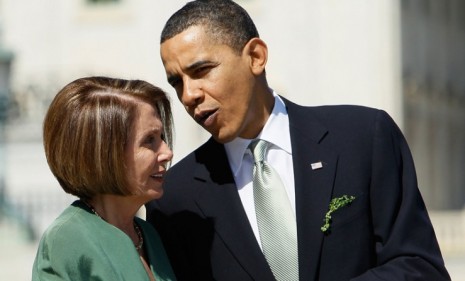Obama is 'rudderless' without Nancy Pelosi
For the last two years, the former House speaker acted as a liberal GPS for the president, says Dana Milbank at The Washington Post. Now, he's lost at sea

A free daily email with the biggest news stories of the day – and the best features from TheWeek.com
You are now subscribed
Your newsletter sign-up was successful
Whatever happened to Nancy Pelosi, asks Dana Milbank at The Washington Post. Little more than a year ago, she was marching across the Capitol, oversize gavel in hand, to vote on the health care bill that she helped bring to the House floor. This month, the president and House Speaker John Boehner completely "cut her out of talks aimed at averting a government shutdown." Her vote against the budget compromise on Thursday was a "stark indication of just how far Obama has moved from the former House speaker." It's to his discredit, says Milbank. The president seems to have forgotten how to negotiate since he dumped Pelosi from his circle, and he's "rudderless" as a result. Here's an excerpt:
The former House speaker ... largely defined [Obama's] first two years in office. Then, she was his rudder, and she kept his presidency on a reliably liberal course. Virtually every important piece of legislation — the stimulus, the health care bill, financial regulations — was negotiated at the conference table in her second-floor office in the Capitol. ...
Obama, without Pelosi charting his leftward course, has drifted to where he appears to feel most comfortable: in the middle, splitting differences... But at what cost? Pelosi loyalists say that, ideology aside, Obama simply isn’t getting as much from negotiations as he should, because his bottom line is fuzzy.
The Week
Escape your echo chamber. Get the facts behind the news, plus analysis from multiple perspectives.

Sign up for The Week's Free Newsletters
From our morning news briefing to a weekly Good News Newsletter, get the best of The Week delivered directly to your inbox.
From our morning news briefing to a weekly Good News Newsletter, get the best of The Week delivered directly to your inbox.
Read the entire piece at The Washington Post.
A free daily email with the biggest news stories of the day – and the best features from TheWeek.com
-
 6 of the world’s most accessible destinations
6 of the world’s most accessible destinationsThe Week Recommends Experience all of Berlin, Singapore and Sydney
-
 How the FCC’s ‘equal time’ rule works
How the FCC’s ‘equal time’ rule worksIn the Spotlight The law is at the heart of the Colbert-CBS conflict
-
 What is the endgame in the DHS shutdown?
What is the endgame in the DHS shutdown?Today’s Big Question Democrats want to rein in ICE’s immigration crackdown
-
 The billionaires’ wealth tax: a catastrophe for California?
The billionaires’ wealth tax: a catastrophe for California?Talking Point Peter Thiel and Larry Page preparing to change state residency
-
 Bari Weiss’ ‘60 Minutes’ scandal is about more than one report
Bari Weiss’ ‘60 Minutes’ scandal is about more than one reportIN THE SPOTLIGHT By blocking an approved segment on a controversial prison holding US deportees in El Salvador, the editor-in-chief of CBS News has become the main story
-
 Has Zohran Mamdani shown the Democrats how to win again?
Has Zohran Mamdani shown the Democrats how to win again?Today’s Big Question New York City mayoral election touted as victory for left-wing populists but moderate centrist wins elsewhere present more complex path for Democratic Party
-
 Millions turn out for anti-Trump ‘No Kings’ rallies
Millions turn out for anti-Trump ‘No Kings’ ralliesSpeed Read An estimated 7 million people participated, 2 million more than at the first ‘No Kings’ protest in June
-
 Ghislaine Maxwell: angling for a Trump pardon
Ghislaine Maxwell: angling for a Trump pardonTalking Point Convicted sex trafficker's testimony could shed new light on president's links to Jeffrey Epstein
-
 The last words and final moments of 40 presidents
The last words and final moments of 40 presidentsThe Explainer Some are eloquent quotes worthy of the holders of the highest office in the nation, and others... aren't
-
 The JFK files: the truth at last?
The JFK files: the truth at last?In The Spotlight More than 64,000 previously classified documents relating the 1963 assassination of John F. Kennedy have been released by the Trump administration
-
 'Seriously, not literally': how should the world take Donald Trump?
'Seriously, not literally': how should the world take Donald Trump?Today's big question White House rhetoric and reality look likely to become increasingly blurred